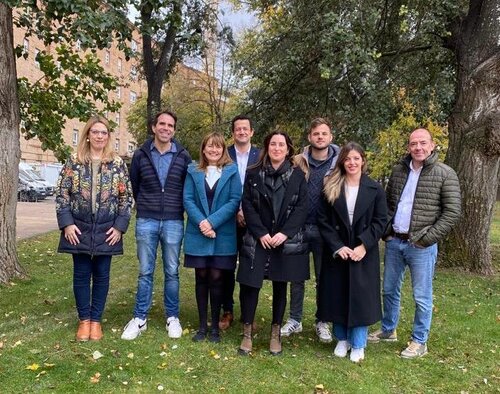European funding to lead research in Lleida to help maintain the safety and health of older people
The GRECS group project will analyse daily activities of older people using sensors and then propose safer alternatives
The European Union has funded the project "DistriMuSe: Distributed multi-sensor systems for human safety and health", led by the Grup de Recerca en Cures en Salut (GReCS) of the Institute of Biomedical Research of Lleida (IRBLleida), to provide more accurate, robust and complete detection solutions to help maintain the safety and health of the elderly, through an innovative combination of multiple sensors that provide continuous coverage and monitoring.
Specifically in Lleida, the living lab of the GRECS group, a collaborative innovation laboratory that aims to develop tools and strategies to address real problems in the environment, will be responsible for assessing the activities of daily living of the elderly using cutting-edge technology, allowing the identification of common patterns of disease that subsequently favour individualised actions for early detection and treatment.
The project will involve the collaboration of technology companies and research staff from IRBLleida, the University of Lleida (UdL) and the Arnau de Vilanova University Hospital in Lleida. Esther Rubinat Arnaldo is the principal investigator of the project and her team is made up of researchers Helena Fernández Lago, Montserrat Gea Sánchez, Filip Bellon, Minerva Granado Casas, Gerard Piñol Ripoll, Manuel Sánchez de la Torre, Francisco Purroy Garcia and Miquel Angel Calderó. The project will start in May 2024 and will run for 36 months.
"Healthcare is facing new challenges related to the ageing population. Patient-centred solutions are needed to provide remote care from home. This change requires technological innovations that enable the monitoring of people's health and that, through artificial intelligence algorithms, allow the early detection and/or progression of the disease in a reliable way. This project aims at the hybrid monitoring of human health, ensuring both spatial and temporal coverage for the monitoring of lifestyle, sleep and physical activity of the elderly," explained the UdL professor and principal investigator, Esther Rubinat Arnaldo.
The project will use advanced sensor technologies (FMCW radars, artificial vision, wearable devices, augmented reality systems), distributed computing systems and artificial intelligence algorithms (detection of events, trends and unusual cases). DistriMuSe is expected to achieve results through more effective recognition of repetitive activities or activities with a strong temporal logic.
At the end of the project, there will be a comprehensive understanding of the physical and mental health and safety risks of large people. Technologies will also have been validated and optimised sensor systems for observation, measurement and human interaction can be improved.

The team is integrated by Minerva Granado Casas, Gerard Piñol Ripoll, Montserrat Gea Sánchez, Manuel Sánchez de la Torre, Esther Rubinat, Filip Bellon, Helena Fernández Lago, Miquel Angel Calderó i Francisco Purroy Garcia






